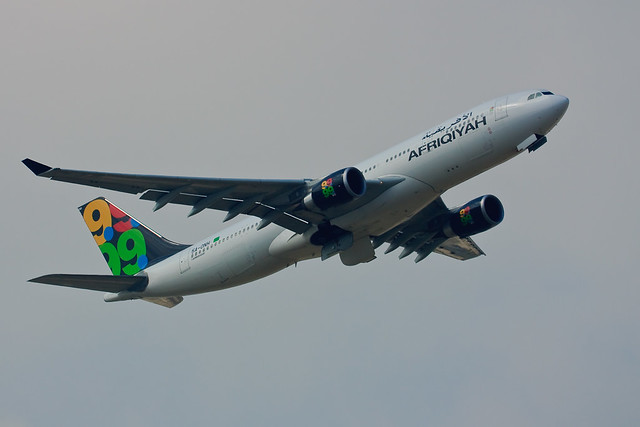 Following the recent Farnborough Airshow in the United Kingdom, Libyan carrier Afriqiyah (8U), has announced plans to convert a previous order of 3 Airbus A321s into an order for A330s in a sign that the carrier is slowly but surely returning to the international scene.
Following the recent Farnborough Airshow in the United Kingdom, Libyan carrier Afriqiyah (8U), has announced plans to convert a previous order of 3 Airbus A321s into an order for A330s in a sign that the carrier is slowly but surely returning to the international scene. |
| An Afriqiyah A330 in better days (Yakusa77) |
In recent months, added demand on routes ex-Libya has necessitated the leasing of additional aircraft - primarily A320s (one from Nouvelair and another from Air Moldova). In July, the airline returned to London Gatwick with a 3x weekly service whilst Ramadan (Islam's Holy Month) has seen them lease two A330s for ferry flights to Saudi Arabia. However, with two of their own A330s still out of action and stored in either Libya or France (both having suffered damage and having undergone subsequent repairs after the Libyan Uprising of 2011) it may be a while before we see them return (if ever) to their once far reaching destinations such as Johannesburg or Beijing.
From a business point view, as a transit hub (part of Afriqiyah's Hub & Spoke strategy during the Gaddhafi years) is Tripoli a safe bet? After all, who in their right mind would want to pass through an airport where people still take pot shots with RPGs at passing aircraft, regardless of the fares they offer?
Sadly, it seems that life in the Libyan capital has yet to return to conditions that are acceptable and secure enough to lure back some larger foreign carriers back to Tripoli (Emirates, KLM and Air France have yet to return) let alone transit passengers.
In relation to the aforementioned leased A330s:
"Afriqiyah Airways has been hit again by the aftermath of the war that saw the removal of President Gadaffi and the old Libyan regime. On Tuesday, an Airbus A330 that had been prepared for Umrah flights was hit by a bullet fired by an unknown gunman and rendered unusable until repaired. On Tuesday, an Airbus A330 that had been prepared for Umrah flights was hit by a bullet fired by an unknown gunman and rendered unusable until repaired."
Other international players such as Lufthansa, Alitalia, Turkish Airlines, Qatar Airways, Etihad and British Airways all seem to believe the still fragile situation in Tripoli is worth the added risk, though their only real interest is either dropping off or picking up passengers to feed into their own networks.
For Afriqiyah its a different story.
Founded as an airline to serve and thus unite Africa (Gadaffi's grand design was to form The United States of Africa) its Hub & Spoke business strategy hinged upon a smooth transit in Tripoli with onward connections into Africa, not to mention low, Libyan subsidized air fares; post-Gaddafi, those very state subsidies are dwindling and with incidents like that mentioned above in Tripoli, we may be in for drastic changes in the airline's business plans:
"According to Tommy Fathi, CEO of Ajwa Aviation Services, an aviation service provider at Tripoli airport "both companies (Afriqiyah and Libyan Airlines) share a history of loss... (they were) heavily subsidised and connected to (the Gaddafi administration), which made them take decisions that went contrary to their business interests"."
![Afriqiyah's Pre 2011 World Network [Click to enlarge] Afriqiyah's Old World Network](http://i.imgur.com/2ij2V.png) |
| Afriqiyah's Pre-2011 World Network |
So, strategically, will Afriqiyah once more turn to its African roots and go head to head
with the likes of Ethiopian Airlines, Kenya Airways and SAA in the hopes
of finding its niche there, or will they abandon Africa altogether to
focus on their own back yard namely Libya and the Mediterranean? To answer this question in part, a very poignant historical truth needs to be considered: During the Libyan Uprising of 2011, for the most part, Africa (that is, the Africa Union) identified with and supported Gaddafi's regime over the National Transitional Council - Libyan's present rulers - something the NTC doesn't seem to have forgotten. In fact, flights to Lagos and Accra - one of the few viable African routes from pre-2011 have yet to be restarted - a question of politics or economics?
By looking at all these factors, we see that the next few years will be crucial to Afriqiyah's future prospects and outlook. From internal stability problems to regional vendettas - all of these will play a critical role if we are to see the likes of Afriqiyah heading south of the Sahara ever again.
